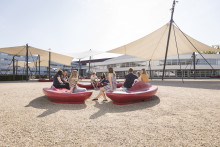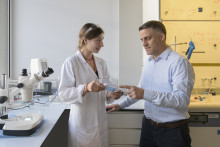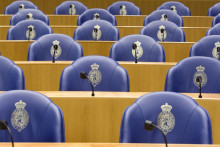Wednesday the House of Representatives debated the government’s coronavirus policy. Many people were happy that higher education institutions could open their doors again. At last, classes for students again, was the general message.
But some wondered what should be done about students who suffer poor health and who cannot be vaccinated. And about caregivers who are afraid of passing on the virus. Can they continue ‘hybrid’ learning? In other words, can classes be given both physically and online?
Van Engelshoven ('I fully understand that question') talked down the idea and warned of work pressure among teaching staff. You cannot ask the impossible, she said. She is unwilling to promise the ‘right’ to hybrid learning.
Continuation
'Yes, educational institutions see it as their core task to ensure that education continues for everyone, including vulnerable students', she said. 'That requires a lot of tailoring, because every vulnerable student is different.'
She thought that it might be possible to come up with other solutions, such as extra social distancing in the classroom. Make all education ‘hybrid’? 'That simply won't be possible in all cases', was the minister's response.
In the end, one of the governing parties, ChristenUnie, tabled a motion, in conjunction with PvdA and GroenLinks. The aim of the motion was to ensure 'that hybrid learning remains possible for this group of students until conditions are safe for them.'
The minister did not oppose that motion, but sounded a caveat ('We will do what can be done') and the House accepted that. The motion was carried unanimously: all parties voted in favour.
75 students
One of the other coronavirus restrictions (no more than 75 students in a room at the same time) was also up for discussion. If you give exams in a large conference centre such as the RAI, Attje Kuiken of the PvdA wondered, are you not allowed to admit more than 75 students? Doesn't it depend on the hall? When taking an exam in large spaces, social distancing is not a problem, she argued, and numbers do not need to be limited.
Van Engelshoven undertook to discuss this with the educational institutions. Nevertheless, the PvdA tabled a motion on the matter, in conjunction with D66, GroenLinks, CDA and VVD. This motion too gained the unanimous support of the House of Representatives.
In addition, almost everyone in the House hopes that youngsters will agree to be vaccinated, but how far should the government go in terms of encouraging or forcing them? Opinions varied on that issue.
The outcome of those discussions: if it is up to a narrow majority of D66, VVD, CDA and Volt, there will be no more free test certificates for admittance to events. Those parties feel that if people do not get vaccinated, they ought to make a contribution. The remainder of the House was opposed to that proposal.







